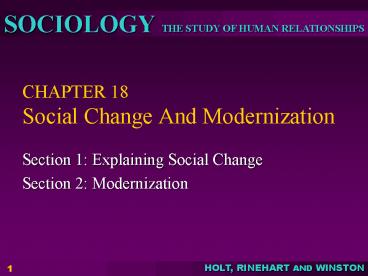CHAPTER 18 Social Change And Modernization PowerPoint PPT Presentation
1 / 11
Title: CHAPTER 18 Social Change And Modernization
1
CHAPTER 18Social Change And Modernization
- Section 1 Explaining Social Change
- Section 2 Modernization
2
Objectives
Section 1 Explaining Social Change
- Summarize the theories that social scientists
have offered to explain the process of social
change. - Explain how the theories on social change have
evolved.
3
Theories of Social Change
Section 1 Explaining Social Change
- Cyclical
- Spengler four stages childhood, youth,
adulthood, old age - Sorokin fluctuation between ideational culture
(spiritual) and sensate culture (scientific) with
idealistic culture in the middle
4
Theories Of Social Change
Section 1 Explaining Social Change
(continued)
- Evolutionary
- early the progress through distinct stages
toward complexity - modern tendency to go along many paths toward
increasing complexity
5
Theories Of Social Change
Section 1 Explaining Social Change
(continued)
- Equilibrium
- Parsons occurs as society adapts to maintain
stability after a change in one area involves
differentiation and integration
6
Theories Of Social Change
Section 1 Explaining Social Change
(continued)
- Conflict
- Marx results from class conflict and revolution
- Dahrendorf results from social conflicts of all
forms
7
How Theories of Social Change Evolved
Section 1 Explaining Social Change
- Older theories focused more on describing social
change and suggested that all societies follow
similar patterns of development - Modern theories provide for different patterns of
development and focus more on why societies change
8
Objectives
Section 2 Modernization
- Contrast the views of modernization theory and
world-system theory on modernization in
less-developed nations. - Identify some of the positive and negative
effects of modernization on social life and the
natural environment.
9
Modernization Theory Versus the World-System
Theory
Section 2 Modernization
- Modernization theory argues that less-developed
countries will eventually modernize - World-systems theory argues that the
concentration of wealth and power in core nations
slows modernization in less-developed countries
10
Positive Effects of Modernization
Section 2 Modernization
- Improved standard of living
- Longer life expectancies
- Lower birthrates
- Higher rates of literacy
- Decrease in economic and social inequality
- More personal comforts
- Improved infrastructure
- Electricity and communication technology
- Establishment of educational institutions
11
Negative Effects of Modernization
Section 2 Modernization
- Loss of some traditional authority for the family
and religion - Weaker social relationships and increased
feelings of social isolation - Moral and ethical questions
- Some environmental problems
- Some health problems

